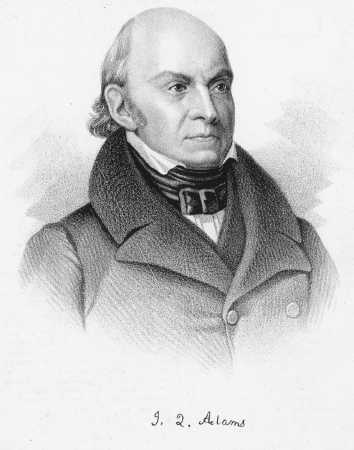40 JOHN
QUINCY ADAMS.
JOHN
QUINCY ADAMS.
He reached Berlin with his wife
in November, 1797 where he remained until July, 1799,
when, having fulfilled all the purposes of his
mission, he solicited his recall.
Soon after his return, in 1802, he
was chosen to the Senate of Massachusetts, from
Boston, and then was elected Senator of the United
States for six years, from the 4th of March, 1804. His
reputation, his ability and his experience, placed him
immediately among the most prominent and influential
members of that body. Especially did he sustain the
Government in its measures of resistance to the
encroachments of England, destroying our commerce and
insulting our flag. There was no man in America more
familiar with the arrogance of the British court upon
these points, and no one more resolved to present a
firm resistance.
In 1809, Madison succeeded Jefferson
in the Presidential chair, and he immediately
nominated John Quincy Adams minister to St.
Petersburg. Resigning his professorship in Harvard
College, he embarked at Boston, in August, 1809.
While in Russia Mr. Adams was an
intense student. He devoted his attention to the
language and history of Russia; to the Chinese trade;
to the European system of weights, measures, and
coins; to the climate and astronomical observations;
while he kept up a familiar acquaintance with the
Greek and Latin classics. In all the universities of
Europe, a more accomplished scholar could scarcely be
found. All through life the Bible constituted an
important part of his studies. It was his rule to read
five chapters every day. Mr. Monroe took the
Presidential chair on the 4th of March, 1817, and
immediately appointed Mr. Adams Secretary of State.
Taking leave of his numerous friends in public and
private life in Europe, he sailed in June, 1819, for
the United States. On the 18th of August, he again
crossed the threshold of his home in Quincy. During
the eight years of Mr. Monroe's administration, Mr.
Adams continued Secretary of State.
Some time before the close of Mr.
Monroe's second term of office, new candidates began
to be presented for the Presidency. The friends of Mr.
Adams brought forward his name. It was an exciting
campaign. Party spirit was never more bitter. Two
hundred and sixty electoral votes were cast. Andrew
Jackson received ninety-nine; John Quincy Adams,
eighty-four; William H. Crawford, forty-one; Henry
Clay, thirty-seven. As there was no choice by the
people, the question went to the House of
Representatives. Mr. Clay gave the vote of Kentucky to
Mr. Adams, and he was elected.
The friends of all the disappointed
candidates now combined in a venomous and persistent
assault upon Mr. Adams. There is nothing more
disgraceful in the past history of our country than
the abuse which was poured in one uninterrupted
stream, upon this high-minded, upright, patriotic man.
There never was an administration more pure in
principles, more conscientiously devoted to the best
interests of the country, than that of John Quincy
Adams; and never, perhaps, was there an administration
more unscrupulously and outrageously assailed.
Mr. Adams was, to a very remarkable
degree, abstemious and temperate in his habits; always
rising early, and taking much exercise. When at his
home in Quincy, he has been known to walk, before
breakfast, seven miles to Boston. In Washington, it
was said that he was the first man up in the city,
lighting his own fire and applying himself to work in
his library often long before dawn.
On the 4th of March, 1829, Mr. Adams
retired from the Presidency, and was succeeded by
Andrew Jackson. John C. Calhoun was elected Vice
President. The slavery question now began to assume
portentous magnitude. Mr. Adams returned to Quincy and
to his studies, which he pursued with unabated zeal.
But he was not long permitted to remain in retirement.
In November, 1830, he was elected representative to
Congress. For seventeen years, until his death, he
occupied the post as representative, towering above
all his peers, ever ready to do brave battle for
freedom, and winning the title "the old man eloquent."
Upon taking his seat in the House, he announced that
he should hold himself bound to no party. Probably
there never was a member more devoted to his duties.
He was usually the first in his place in the morning,
and the last to leave his seat in the evening. Not a
measure could be brought forward and escape his
scrutiny. The battle which Mr. Adams fought, almost
singly, against the proslavery party in the
Government, was sublime in its moral daring and
heroism. For persisting in presenting petitions for
the abolition of slavery, he was threatened with
indictment by the grand jury, with expulsion from the
House, with assassination; but no threats could
intimidate him, and his final triumph was
complete.
It has been said of President Adams,
that when his body was bent and his hair silvered by
the lapse of fourscore years, yielding to the simple
faith of a little child, he was accustomed to repeat
every night, before he slept, the prayer which his
mother taught him in, his infant years.
On the 21st of February, 1848, he
rose on the floor of Congress, with a paper in his
hand, to address the speaker. Suddenly he fell, again
stricken by paralysis, and was caught in the arms of
those around him. For a time he was senseless, as he
was conveyed to the sofa in the rotunda. With reviving
consciousness, he opened his eyes, looked calmly
around and said "This is the end of earth;"
then after a moment's pause he added, "I am
content." These were the last words of the grand
"Old Man Eloquent."

